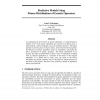337 search results - page 3 / 68 » Game Theory Using Genetic Algorithms |
GECCO
2010
Springer
13 years 5 months ago
2010
Springer
This paper takes an economic approach to derive an evolutionary learning model based entirely on the endogenous employment of genetic operators in the service of self-interested a...
GECCO
2004
Springer
13 years 10 months ago
2004
Springer
Abstract. We use case injected genetic algorithms to learn to competently play computer strategy games. Such games are characterized by player decision in anticipation of opponent ...
CEC
2007
IEEE
13 years 11 months ago
2007
IEEE
— Recent large scale experiments have shown that the Normalized Information Distance, an algorithmic information measure, is among the best similarity metrics for melody classi�...
GECCO
2003
Springer
13 years 10 months ago
2003
Springer
The MasterMind game involves decoding a secret code. The classic game is a code of six possible colors in four slots. The game has been analyzed and optimal strategies have been po...
FOGA
1994
13 years 6 months ago
1994
An important goal of the theory of genetic algorithms is to build predictive models of how well genetic algorithms are expected to perform, given a representation, a fitness lands...


